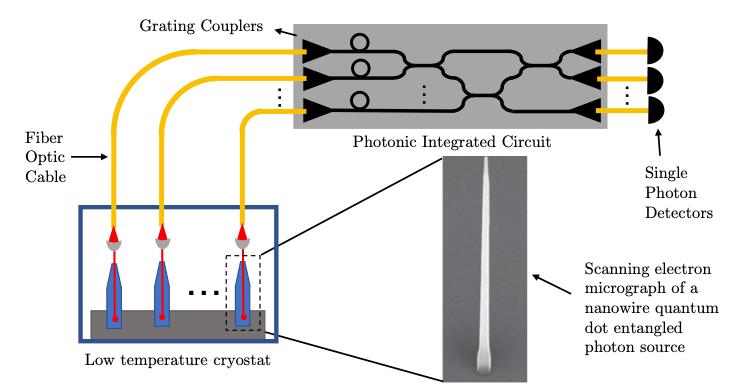Summary
Strongly-coupled field theories describe both fundamental and applied quantum problems. With the goal of exploring these theories, we are working to develop functional quantum simulators, which take advantage of the phenomenon of superposition. Quantum simulators can perform nontrivial quantum computations more efficiently than classical technology, while requiring less processing power than a universal quantum computer. Through a variety of novel techniques, we are moving to create 2-4 qubit “gauge field” test units. Our goal is to assemble arrays encompassing up to 50 qubits. Along the way, we hope to demonstrate that such arrays can carry out simulations of fundamental physics and complex quantum materials.

Related Content

Topological Properties of Exciton-Polaritons in a Kagome Lattice as a Solid-state Quantum Simulator
Summary In this project, we build a solid-state quantum simulator for engineering a specific Hamiltonian. Quantum simulators are purpose-built devices with little to no need for error correction, thereby making this type of hardware less demanding than universal quantum computers. Our platform consists of exciton-polariton condensates in multiple quantum-wells sandwiched in a semiconductor Bragg […]
December 8, 2018

Photonic Quantum Processor
Photonic quantum processors based on integrated quantum photonic circuits require entangled photon pairs to perform quantum computations. However, current state-of-the-art technologies utilize probabilistic entangled photon sources with limited pair-extraction efficiencies, negatively affecting the computation speed. This project aims to boost the speed of on-chip quantum operations by using bright, on-demand entangled photon sources with an […]
April 24, 2023

Silicon Platform for Electron Spin Qubits
Summary Scaling solid-state quantum processors to a useful threshold while maintaining the requisite precision in quantum control remains a challenge. We propose a quantum metal-oxide-semiconductor (QMOS) architecture operating at cryogenic temperatures that is based on a network/node approach as a means to scalability. By working with QMOS, we benefit from the deep investments and […]
December 7, 2018
Implementing High-fidelity Quantum Gates in Multi-level Trapped Ions
Summary The scalability of quantum processors is limited by current error rates for single-qubit gates. By encoding more than a single bit of information within a single ion, multi-level “qudits” offer a promising method of increasing the information density within a quantum processor, and therefore minimizing the number of gates and associated error rates. […]
July 30, 2018

